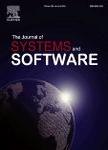版权所有:内蒙古大学图书馆 技术提供:维普资讯• 智图
内蒙古自治区呼和浩特市赛罕区大学西街235号 邮编: 010021

作者机构:Brunel Univ London Dept Comp Sci London England Edge Hill Univ Dept Comp Sci Ormskirk England
出 版 物:《JOURNAL OF SYSTEMS AND SOFTWARE》 (系统与软件杂志)
年 卷 期:2020年第164卷
页 面:110543-000页
核心收录:
学科分类:08[工学] 0835[工学-软件工程] 0812[工学-计算机科学与技术(可授工学、理学学位)]
主 题:Information retrieval (IR) Lexical content Clustering Distributed development Object-oriented (OO) Open-source software
摘 要:Collaborative development is a paradigm shift in software development. Loosely coupled developers coordinate their work via distributed versioning systems (SVN, Git, and others), code reviews and priority-led bug tracking systems. This development approach allows many different developers to input additional source code to the same source artifact. This article focuses on the lexical content of the source code produced in a collaborative environment. The lexical content is described as the dictionary of the key terms contained within a source artifact. We posit that the lexical content of a Java class will increase as long as more developers add more content to the same class. We analyse the 100 top-ranked GitHub applications (at the time of the sampling) written in Java. Each of their classes is reduced to its lexical content, its size (in LOCs) recorded, as well as the number of different developers who contributed to its source code. Our results show that (i) the lexical content of Java classes is bounded in size, (ii) more developers make the size of the lexical content larger, and (iii) the lexical content of a system s classes might increase with more developers, but depending on its application domain. The implications for practitioners are two-fold: (i) classes with a large set of lexical content should be split in multiple classes, to minimize the need for further maintenance;and (ii) classes developed by many developers should adhere to specific guidelines so that its lexical content does not increase boundlessly. We tested our results in a tailored case study and we confirmed our findings: larger-than-threshold class corpora tend to deteriorate the class cohesion. (C) 2020 Elsevier Inc. All rights reserved.